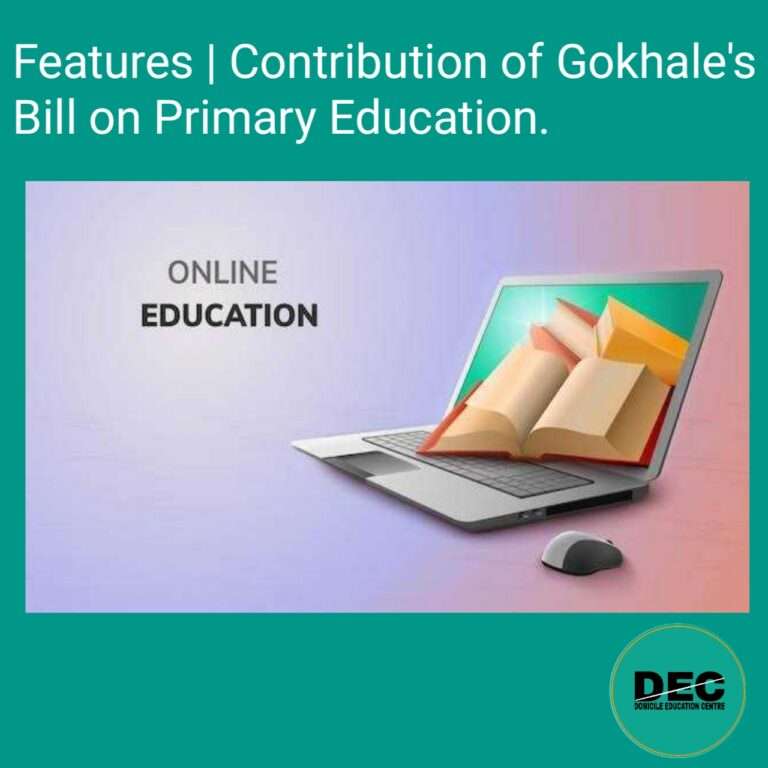Table of Contents
ToggleFeatures | Contribution of Gokhale's Bill on Primary Education.
Gokhale's Bill 1910-12
Here in this title You will get to Know about :
- Very Short Questions Answer on Gopal Krishna Gokhale’s Bill.
- Features of Gopal Krishna Gokhale’s Bill on Primary Education.
- Contribution of Gopal Krishna Gokhale’s Bill on Primary Education.
- Indians Resolution of 1913 on Primary Education.
Very Short Questions Answer
1. Who was Gopal Krishna Gokhale ?
Ans: Gopal Krishna Gokhale was a Veteran Nationalist leader of India and was an active member of the Indian National Congress.
2. In which year Gokhale was elected as the president of the Indian National Congress ?
Ans: In the year of 1905.
3. In which place Gokhale become the president of Indian National Congress ?
Ans: In Bombay.
4. When Gopal Krishna Gokhale become the non-official members of the British Empirical Legislative Council ?
Ans: In 1902.
5. When Gopal Krishna Gokhale submitted his private bill to the ‘Empirical Legislative Council’ to make primary free and compulsory education ?
Ans: On 18th March, 1910.
6. When Gopal Krishna Gokhale raised his second humble proposal in the council to make primary education free and compulsory ?
Ans: On 16th March, 1911.
7. What was the main objective of Gokhale’s Bill of 1911 ?
Ans: The main objective of Gokhale’s Bill of 1911 was to make primary education free and compulsory in India.
8. Who introduced the Compulsory Primary Education Bill of 1910 ?
Ans : Gopal Krishna Gokhale.
Archives
Features of Gopal Krishna Gokhale's Bill on Primary Education.
9. Discuss the Salient features of Gokhale’s Primary Education Bill of 1911.
Ans: The Salient features of Gokhale’s Primary Education Bill of 1911 are :
(i) Compulsion should be made in certain areas where at least 33% of male children had already attended in schools.
(ii) Provision for compulsion should be made from 6 to 10 years of age.
(iii) Cost of education should be borne by the local authorities together with the state government at the ratio of 1:2.
(iv) A separate Department of Education be opened under the central government for taking necessary steps of making primary education compulsory.
(v) A Secretary be appointed for education and a statement describing the progress of education be presented in the budget report.
Contribution of Gopal Krishna Gokhale's Bill on Primary Education.
10. Discuss the contributions of Gopal Krishna Gokhale towards primary education in India.
or
Give the Clauses of Gokhale’s Bill presented in 1911 for making primary education compulsory.
Ans: In order to make primary education free and compulsory. Following are the contributions of Gopal Krishna Gokhale towards primary education :
(i) First priority give compulsion for boys :
In the instance, compulsion should be enforced at the beginning only for the boys. But gradually it should be extended to the girls also.
(ii) Give Opportunity for attended schools children:
Primary education should be made compulsory where a certain number of children at least 33% of boys and girls had already attended schools under instruction.
(iii) Period of age limit:
Compulsion should be restricted to a period of four years only. The age limit of compulsion be fixed at 6 to 10 years.
(iv) Exempted from paying fees:
Compulsion should be made to those guardians whose income les than rupees ten per month be exempted from paying fees.
(v) Levy educational cess:
The local authorities be given to levy educational cess in order to meet with the cost of education.
(vi) Power to local authorities for compulsion:
The Local Board and Municipalities should have the responsibility to introduce compulsion for the establishment and recognized for new schools.
(vii) Two-third expenditure on primary education:
Two-third of the total expenditure involved in the scheme of compulsion by the provisional governments and one-third of it be borne by the state governments and the local authorities respectively.
11. What were the reason for rejecting Gopal Krishna Gokhale’s Bill towards contribution on primary education ?
Ans: While the Bill was taken up for discussion in the Council on 17th March, 1912. But at last due to the following reasons the Bill was rejected :
(i) The Bill was put to vote and defeated by 38 to 13.
(ii) There was no popular demand raised at that time to make primary education compulsory.
(iii) The people of the country were not prepared to accept compulsion.
(iv) The state government were not supported the Bill.
(v) A section of the educated class of Indian people were not supporting the Bill.
(vi) The Local authorities were not willing to levy educational cess.
(vii) Many administrative difficulties were likely to crop up while creating the Bill.
Point to be Remember
- Gokhale’s heroic defeat on making primary education free and compulsory education in the county during the British rule.
- In the British Emperial Legislative Council as a member, he said “My lord, I know that my bill will be thrown out before the day closes. I make no complaint. I shall not even feel depressed. We the present generation in India can only hope to serve our country by our failure. The men and women who will be privileged to serve her by their success will come later.”
- As a great patriot, he said again, “We shall be entitled to feel that we have done our duty, and when the call of duty is clear, it is better even to labour and fail than not to labour at all.”
Indians Resolution of 1913 on Primary Education.
12. Discuss about the Indian’s resolution of 1913 on primary education.
Ans:
Introduction :
While Majesty King Emperor George V who visited India in 1912 was unhappy with the situation of the prevailing educational steps taken by government and he sought explanation from the Government of India as to why Gokhale’s Bill was rejected. In this regards, he said, “It is my wish that there may spread over the land a network of schools and colleges, from which will go forth loyal and manly and useful citizens, able to hold their own industries and agriculture and all the vocations in life.”
Accordingly, the Government of India had declared a new policy in the form of Government Resolution on 21th February in 1913 covering all the major areas of education under Education Department and had offered a recurring grant of 50 lakhs of rupees for popular education in India to cover all aspects of education viz primary, secondary, collegiate, agricultural veterinary, forestry, medical etc. were included.
Indian’s resolution of 1913 on primary education :
Following are the suggestions made by the Indian’s resolution of 1913 on primary education which are mentioned below :
Related Post Just Click Here : Features of Gandhiji’s Basic Education.
Class-11 | Education | Notes |
Class-11 | Education | Question Papers |
Calendar of Content List:
| M | T | W | T | F | S | S |
|---|---|---|---|---|---|---|
| 1 | ||||||
| 2 | 3 | 4 | 5 | 6 | 7 | 8 |
| 9 | 10 | 11 | 12 | 13 | 14 | 15 |
| 16 | 17 | 18 | 19 | 20 | 21 | 22 |
| 23 | 24 | 25 | 26 | 27 | 28 | |


Recent Comments